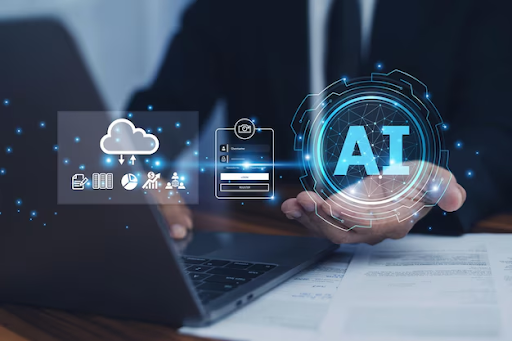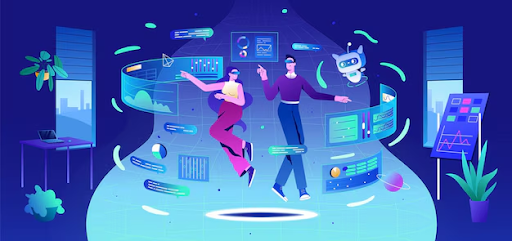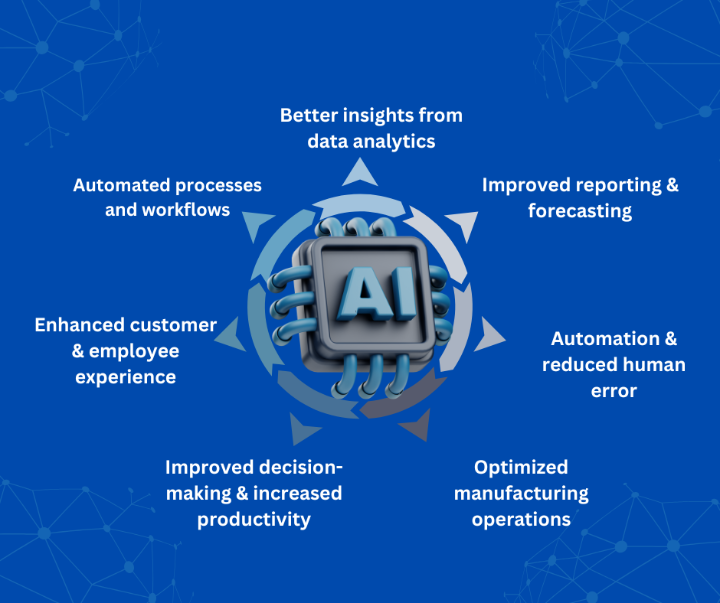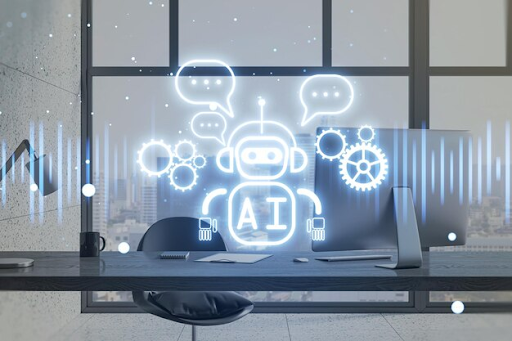In this article, we will explore the increasingly expanding role of AI in ERP systems, examine its additional capabilities, highlight leading AI-integrated systems, discuss deployment challenges, and forecast future trends.
1. The rise of AI in business

The rise of Artificial Intelligence (AI) has attracted widespread attention, and by 2025, businesses cannot ignore it. The conversation about AI has evolved from a topic to a major forum. This change is due to the rapid and continuous advancement of AI technology since the launch of OpenAI's ChatGPT, making AI accessible to a wider audience.
We are witnessing tech giants continue to position themselves in the AI race:
- Microsoft's total investment in AI is estimated to be at least $40 billion, including areas such as research, acquisitions, and strategic partnerships. This includes foundational relationships with OpenAI and strategic investments in other leading AI companies.
- Microsoft Copilot has been deeply integrated across its entire product suite, with specialized versions for ERP workflows and business processes.
- SAP and NVIDIA are currently collaborating to accelerate the ability to harness the transformative power of data and AI generated on SAP's cloud solutions and applications for enterprise customers.
- Google has launched Gemini, the next-generation AI model designed to compete with OpenAI's services, integrating advanced capabilities across its entire ecosystem.
- Amazon has launched various AI features on AWS and made a significant investment in Anthropic, a promising competitor to OpenAI.
- Meta continues to drive its AI initiatives, deploying advanced models and embedding them into its products.
- After remaining relatively quiet, Apple has stepped into the spotlight by integrating Apple Intelligence into its ecosystem and collaborating with Chat GPT to further enhance its AI capabilities.
The rise of artificial intelligence (AI) is bringing about a revolution in many fields, and enterprise resource planning (ERP) systems are no exception. Improvements from AI are expected to drive automation, decision-making, and enhance operational efficiency in ERP solutions.
Enterprise software accounts for 41% of the global software market in terms of revenue, with Enterprise Resource Planning (ERP) systems playing a crucial role in the business operations of many organizational departments. With the development of AI, the scope of ERP is increasingly being expanded and rapidly developed.
2. Applying AI to ERP

Artificial intelligence, often referred to as AI, refers to computer systems equipped to simulate tasks that typically require human intelligence. These tasks range from image recognition and speech interpretation to complex challenges such as problem-solving, decision-making strategy development, and language translation.
Sophisticated technologies such as machine learning, natural language processing, computer vision systems, deep learning, and predictive analytics are the foundation for these AI functions.
When ERP systems apply AI, they integrate advanced technologies such as machine learning algorithms, natural language processing capabilities, generative AI, and predictive analytics.
This convergence empowers ERP platforms to extract actionable insights from vast datasets, streamline and automate complex workflows, improve planning accuracy, enhance forecasting precision, introduce virtual assistants, and elevate performance analytics.
When ERP systems "don" the power of AI, they are equipped with advanced technologies such as:
- Machine Learning: Allows the system to automatically learn from data, identify hidden patterns and trends, thereby making accurate predictions and optimizing processes.
- Natural Language Processing (NLP): Helps the system understand and interact with users through natural language, allowing for easy communication via voice or text.
- Generative AI: The ability to create new content, from reports and analyses to product designs, helping to accelerate the creative process and improve productivity.
- Predictive Analytics: Using historical data and algorithms to predict future events, allowing businesses to proactively respond and make strategic decisions.
The harmonious combination of these technologies brings significant benefits to the ERP system:
- Extracting detailed information: ERP has the ability to "dig deep" into vast amounts of data to uncover valuable insights, helping businesses better understand their operations, customers, and market.
- Process automation: Complex, repetitive tasks are automated, freeing employees from tedious work and allowing them to focus on more creative activities.
- Improving accuracy: Human errors are minimized, and the accuracy of plans, forecasts, and decisions is significantly enhanced.
- Virtual assistant: Intelligent virtual assistants can assist users in searching for information, performing tasks, and answering questions, helping to increase productivity and work efficiency.
- Performance analysis: The ability to conduct comprehensive performance analysis helps businesses continuously evaluate and improve their operations.
In summary, AI is bringing a new breeze to ERP systems, transforming them into powerful, intelligent, and flexible tools that help businesses gain a competitive edge in the digital era.
3. The situation of ERP with AI in 2025

In 2025, the difference will no longer be whether ERP systems have AI features or not, but rather the specialization of AI deployment methods.
More and more businesses are using AI assistants and bots.
Suppliers are increasingly integrating AI assistants and bots into their ERP software. This is not just a passing trend - it seems to be a shift towards more automated and efficient workflows.
The cloud system makes AI more accessible.
Cloud ERP systems are no longer just about data management; they are also paving the way for broader access to AI capabilities. By harnessing the power of the cloud, businesses of all sizes can leverage advanced AI tools without significant investment.
The demand for more AI experts
As more and more businesses want AI, the hunt for experts is becoming more intense. The skills that businesses need are constantly changing, so there is always something new to learn.
Not all ERP providers keep up with the pace.
While many ERP providers are racing to incorporate new AI features, some are falling behind. They are trying to add the latest tools to maintain competitiveness and meet customer demands.
Some ERP providers may resort to strategic acquisitions to accelerate the integration of AI features into their ERP solutions. This is illustrated by IFS's acquisition of Falkonry, a company that develops AI-based time series data analysis tools.
Read more: The future of ERP systems application Vietnamese enterprise
A typical example of applying AI in manufacturing ERP
Manufacturers are currently reaping the benefits of integrating AI technology into their ERP and production software. AI-supported features such as real-time monitoring and predictive maintenance have increased. With AI-supported ERP systems, computer vision can be used for quality control and automated inspection. Smart orders based on constraints and production schedules can also be implemented.
Manufacturing industries have become significant beneficiaries of AI-supported ERP, with sophisticated implementations becoming the standard by 2025. AI-supported features now extend beyond basic monitoring to include automated decision-making in production scheduling, quality control, and supply chain optimization. Real-world implementations show a 30–40% increase in efficiency at facilities using AI-enhanced ERP systems.
Agentic AIs: The New Digital Workers
Although still in its early stages, Agentic AI could represent an exciting shift in how businesses interact with their ERP systems in 2025 and beyond.
AI agents have the potential to function as digital workers handling entire business tasks. The difference between them and traditional automation is the ability to understand context and work across various parts of the ERP system. For example, an AI agent has the ability to track inventory, coordinate with suppliers, check budgets, and adjust schedules - all while adhering to established business rules.
An interesting possibility is having multiple AI agents working together. Imagine one agent monitoring your supply chain while another agent manages the production schedule. If there is a delay from the supplier, these agents have the ability to coordinate to adjust the plan and notify the relevant team members:
- Processing and reconciling invoices
- Inventory replenishment order management
- Provide early warnings about business issues
- Answer common procedural questions
- Coordinate the maintenance schedule
- Identify patterns in business data
Although it is still early to predict their full impact, AI agents could become an interesting addition to ERP systems as businesses explore new ways to streamline operations. The key will be to find the right balance where these tools support rather than complicate existing processes.
Read more: The benefits of Agentic in optimizing the supply chain
4. The benefits of AI in ERP

The application of AI in ERP systems brings many practical benefits, helping businesses optimize operations and enhance efficiency in various aspects:
- Process automation: AI automates repetitive tasks, freeing employees to focus on more complex and creative work.
- In-depth data analysis: AI provides valuable insights from ERP data, supporting more accurate data-driven decision-making.
- Enhancing productivity: AI helps employees work more efficiently by automating tasks and providing timely insights.
- Improving reports and forecasts: AI supports predictive analysis, helping to improve the accuracy of reports and forecasts, thereby aiding better planning and decision-making.
- Enhancing customer and employee experience: Tools like chatbots and AI virtual assistants improve interactions and experiences for both customers and employees.
- Smart decision-making: AI makes data-driven decision-making easier by analyzing and synthesizing information from ERP data.
- Minimizing human error: Automating processes helps reduce human error in ERP processes.
- Optimizing production operations: AI improves inventory management, predictive maintenance, anomaly detection, and quality control, helping to increase efficiency, uptime, and productivity.
The application of AI in ERP systems is not just a technological improvement, but also a transformation towards an intelligent, efficient, and human-centered operating environment. These benefits contribute to creating a more intuitive work environment, where technology serves and enhances our daily work experience.
5. Challenges of implementing AI in ERP

Integrating artificial intelligence (AI) into enterprise resource planning (ERP) systems brings immense potential, but also comes with numerous challenges. To fully harness the benefits of AI in ERP, businesses need to face and overcome the following barriers:
Data quality
Core issue: AI only operates effectively when "nurtured" with quality data. Inaccurate, incomplete, or inconsistent data can lead to erroneous decisions and reduce the system's effectiveness.
Solution: Businesses need to invest in data cleaning, standardization, and integration before deploying AI. Build a strict data management process and ensure that the data is always updated and accurate.
Compatibility
Core issue: Not all ERP systems are compatible with AI technologies. Integrating AI may require significant changes to existing infrastructure, software, and processes.
Solution: Businesses need to thoroughly assess the compatibility of the current ERP system with AI solutions. Choose reputable suppliers with experience in integrating AI into ERP.
Investment cost
Core issue: Implementing AI in ERP requires a significant investment, including costs for software, hardware, personnel, and training.
Solution: Businesses need to create a detailed budget plan and clearly define their investment goals. Seek funding sources and choose AI solutions that fit within your budget.
Human resources
Core issue: The deployment and operation of AI systems require a team of employees with in-depth knowledge and skills in AI, as well as an understanding of the business processes of the enterprise.
Solution: Businesses need to invest in training and developing their workforce. Attract AI experts and build an internal team capable of managing and operating the system.
Cultural change
Core issue: The application of AI can change the way departments work and interact within a business. This could cause resistance from employees.
Solution: Businesses need to build an open culture and be ready to embrace change. Clearly communicate the benefits of AI and create conditions for employees to familiarize themselves with new technology.
Risk and security
Core issue: AI systems can encounter security problems, errors in data processing, or make inaccurate decisions.
Solution: Businesses need to implement strict security measures to protect data and systems. Regularly test and evaluate the AI system to ensure stable and accurate operation.
Ethics and responsibility
Core issue: The use of AI in business must adhere to ethical principles and social responsibility. Businesses need to ensure that AI does not cause discrimination, invade privacy, or create negative impacts on society.
Solution: Businesses need to establish rules and guidelines for the ethical use of AI. Ensure that the AI system is developed and used in a transparent, fair, and responsible manner.
6. The future trends of AI in ERP

Some AI innovation trends are reshaping the ERP landscape:
- Explainable AI (XAI): As AI models become increasingly complex, the need to understand the logic behind AI decisions in ERP systems will grow, driving the adoption of XAI.
- Hyperautomation: The pursuit of higher efficiency will lead to hyperautomation, deeply integrating AI into ERP software to automate many business processes.
- Augmented intelligence: Enhancing human intelligence with AI will create more collaborative interactions between AI and humans in the ERP environment.
- Multiplatform AI capabilities: The ability of AI to operate on various ERP platforms and integrate with different systems will drive more unified and multifunctional business operations.
The interaction between AI and ERP opens up new avenues for innovation and opportunity. The AI-ERP landscape of 2025 has evolved into a more mature ecosystem, with clear models emerging:
- Standardize basic AI features across multiple platforms.
- AI expertise by industry.
- Focus more on AI governance and ethics.
- Integrating with emerging technologies such as quantum computing.
- Emphasizing sustainability through AI optimization.
While the process of innovation continues to accelerate, organizations have now established frameworks to evaluate and implement AI-enhanced ERP systems, making adoption more structured and predictable.
7. Conclusion
In summary, the application of AI in ERP systems is not only an inevitable trend but also the key for businesses to enhance their competitive edge, optimize operations, and achieve outstanding success in the digital era. However, to implement AI effectively, businesses need to focus on investing in quality data, appropriate technology, a professional workforce, and developing a clear digital transformation strategy. By overcoming challenges and maximizing the potential of AI, businesses can transform their ERP systems into an intelligent, flexible, and powerful platform, driving sustainable development and prosperity in the future. Contact us to receive free consulting materials on the latest digital transformation trends.